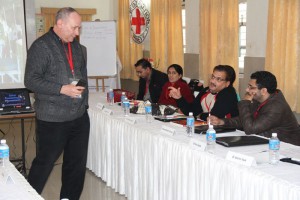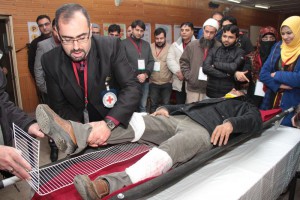
ICRC Trainer Dr Francois Irmay interacts with the doctors from Jammu at the Government Medical College, Jammu. ©ICRC, Ashish Bhatia
Timely and effective emergency care can reduce high morbidity and mortality among trauma cases. Therefore, to strengthen emergency health care services the ICRC is supporting health authorities in Jammu and Kashmir (J&K) to conduct the Emergency Room Trauma Course (ERTC) for their medical officers. In December 2014, one ERTC each in Jammu and Srinagar was conducted. In addition to these two training sessions, one training of trainers for ERTC was also conducted in Srinagar in December 2014.
The course specifically trained the participants on standardized diagnostics and therapeutic procedures to be applied on the patient upon arrival in the hospital Emergency Room to reduce trauma-related injury and death. Explaining this further, Dr Francois Irmay, Senior Surgeon and ERTC Consultant in the ICRC said, “The ERTC, established by the ICRC many years ago on an internationally recognized scientific base, is aimed at helping doctors who work in emergency rooms to deal with trauma patients in remote settings. This is a philosophy of prioritizing injuries of the patients and helping the doctors identify, help and treat in order to save the lives of severely injured patients.”
In Jammu, 19 medical officers mainly from different districts of Jammu participated in the training. Among the participants, two were specialists and the rest were medical officers from public hospitals such as the district hospital, community health centre and urban health post. In Srinagar, 20 participants from different departments of the Government Medical College (GMC) took part in the three day course. In addition, six specialists from the batch of participants who had undergone ERTC in 2013 participated in the training of trainers (ToT) for ERTC in Srinagar. Earlier, the first ERTC had been jointly organized by the ICRC and the Directorate of Health Services Kashmir (DHSK) in April 2013, and 20 doctors were trained in it.
For Dr Safin Tahir, Department of Anesthesiology and Critical Care, Government Medical College, Srinagar, a participant at the ERTC course in December 2014, the course helped her enhance her knowledge in dealing with such emergencies. Sharing her experience, she said,” I can now clearly remember the ABCs of trauma management. Even though I was a little oriented before but this course made me even wiser in tackling emergencies and handling trauma cases in a better way.”

Dr Abdullah Qazzaz, ICRC Trainer, conducting a practical demonstration for doctors from Srinagar at the Government Medical College, Srinagar. ©ICRC, Ashish Bhatia
The essence of the training was best captured in the words of Prof. Rafiq Ahmad Pampori, Principal and Dean, Government Medical College Srinagar. He said, “The training of our doctors in such advanced life support emergency trauma courses will go a long way, more so because the trained doctors will now pass on the learning to rest of staff as well.”
With regard to expertise in medical emergency response, ICRC has references and long practices regarding the provision of immediate assistance to wounded and acutely sick people on the scenes of emergencies, especially in situations with limited resources. The course which is held in different countries across the globe therefore enables capacity-building of the participants to reinstate that timely and effective emergency care can have great positive influence on the mortality and the morbidity of casualties.
See a related video here: https://blogs.icrc.org/new-delhi/2015/01/29/training-in- emergency-room-trauma-in-j-k-gets-a-boost/

